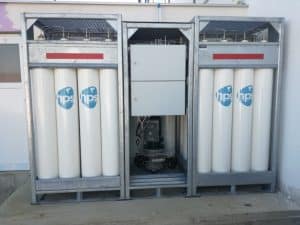Besides replacing old devices to put in newer, more efficient ones, there also seems to be a trend toward more complex solutions. For example, Sunfire expects that at some point, entire neighborhoods will be supplied with energy through a combination of solar PV, heat pump and large fuel cell devices. These multi-energy residential systems will no longer produce heat and power for individual buildings but several residential units at once.
Similarly, Home Power Solutions, also known as HPS, is redoubling its efforts to provide homeowners with off-grid CHP solutions for energy-independent buildings. In mid-February, the business announced it had partnered with Gasag, a Berlin-based gas supplier, to install its products.
HPS said it was now planning to ramp up sales. Since early 2019, the company has been offering homeowners a system to store self-generated renewable energy, with the aim of making them energy-independent throughout the year. Called Picea, it consists of a solar PV unit equipped with a load controller and an inverter, batteries, an electrolyzer, a fuel cell and ventilation (see H2-international, September 2018).
The 300-bar modules offered by HPS (see fig. 2) are made by Wystrach, based in Weeze, Germany. The supplier announced the collaboration with HPS a year ago, during the Energy Storage Europe show in Düsseldorf. At the show, Wystrach’s sales director, Wolfgang Wolter, said that ”Picea is a great example of how to use our stationary solutions for maximum benefit. Our modules can adapt to very different consumption profiles, from single-family homes to office buildings and power plants.“ The electrolyzer integrated into Picea is delivered by HPS’ business partner Enapter.
…
read more in H2-international May 2020


























0 Comments